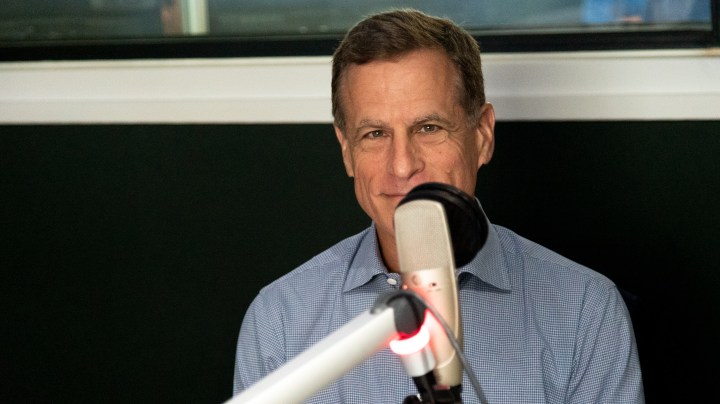
For Dallas Fed president, the phase one deal is “stabilization”
For Dallas Fed president, the phase one deal is “stabilization”

President Donald Trump is set to sign a phase one trade deal with China Wednesday, which may be the first step in calming trade tensions between the two countries in an 18-month trade war.
While the trade war may be on hold for the time being, it has changed the way that the officials at the Federal Reserve think about trade when considering risks to the economy. “Marketplace” host Kai Ryssdal spoke with Robert Kaplan, president and CEO of the Federal Reserve Bank of Dallas, about how the Fed has reacted to the trade turmoil. The following is an edited transcript of their conversation.
Kai Ryssdal: So here we sit, conceivably at the beginning of the end of the trade war. One never knows exactly what’s going to happen. How are you feeling?
Robert Kaplan: Well, I don’t think it’s the beginning of the end of the trade war. I think it is a beginning of some stabilization, we hope. I think the trade dispute with China is going to go on for years. But I do think that the implementation of this phase one deal is dramatically better than the alternative, which would have been escalation. And I think that that could have well been damaging to global growth and the U.S. economy.
Ryssdal: To the specific point of why we wanted to get you on the phone, Federal Reserve Chair Jerome Powell has talked about it many times. You and I have spoken about it, what trade and the trade uncertainty have done to this economy the past 18 months. I’m curious as to how it has changed the thinking in that big conference room in the building on Constitution Avenue, when y’all get together and talk about things.
Kaplan: Well, it’s impacted our thinking in that we’re dealing with three specific challenges right now. Global growth is very sluggish and, in fact, probably more sluggish than it’s been since 2009. Manufacturing, related to that, in the United States is weaker than it’s been since 2009. And business fixed investment is sluggish. It’s been offset by the fact we’ve had a strong consumer. We think all of those three weaknesses are related very heavily to trade and trade uncertainty.
Ryssdal: This is a little sideways, but do you all actually get on planes and go to Washington or you do a conference call?
Kaplan: In person. We sit in a room, we shut the door and no devices in the room. And meetings are all in person. Nobody calls in.
Ryssdal: Interesting. OK, back to the subject. As you start thinking, then, about this new era of increased stability, I suppose, on the assumption that it’s factored in a whole lot in the past 18 months to monetary policy, how much you figure it’s gonna weigh on it now?
Kaplan: Well, I don’t think trade uncertainty has gone away. And when I talk to businesses, they are still concerned about trade uncertainty. But I think they’re hopeful for a little bit more stability, a little bit more predictability, which will lead to better economic outcomes here.
Ryssdal: Let me ask the guy sitting in Dallas: What’s weighing more on you, the United States-Mexico-Canada Agreement or China?
Kaplan: For Texas, and I actually think for the United States, shoring up our trade arrangements in North America was essential. The trade tensions with China last year were challenging, but the threat a few months ago against Mexico, because of the border situation, the threat of escalated tariffs, that really had a substantial effect on the outlook of businesses. The fact that we’ve got stabilization now in that relationship we think will help the U.S. be more globally competitive, and we believe take share from Asia in the future.
Ryssdal: Oh, that’s interesting. You actually think that’s going to happen, taking share from Asia?
Kaplan: We think that’s what was happening before the trade dispute started with Mexico. We think U.S. companies were becoming more globally competitive. The trade relationship with Mexico was key to that. And our belief was we were taking share from Asia, so we would hope that that would resume and continue.
Ryssdal: All right, so here comes the poke-you-in-the-eye question: Do you think China and USMCA and the talk of European car tariffs and all of that jazz, has the last 18 months in global trade been worth it? Have we gotten where we wanted to be?
Kaplan: I think time will tell.
Ryssdal: Come on. Time will tell?
Kaplan: Listen, let’s put it differently. We think USMCA was a modernization from NAFTA, not a material change, but a modernization. I think we’re not necessarily seeing the benefits yet. But I think to have a dispute over technology transfer, intellectual property rights with China, who we’re going to be competing with for the next number of decades, it’s understandable why the U.S. wanted to have an ability to address those issues.
There’s a lot happening in the world. Through it all, Marketplace is here for you.
You rely on Marketplace to break down the world’s events and tell you how it affects you in a fact-based, approachable way. We rely on your financial support to keep making that possible.
Your donation today powers the independent journalism that you rely on. For just $5/month, you can help sustain Marketplace so we can keep reporting on the things that matter to you.












